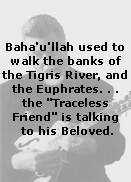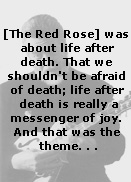

TB: The Voices of Baha'?
DC: Yeah. Voices of Baha' And I've been on 6-8 tours through Europe and Russia, Australia, New Zealand, Indonesia and China. All over the world for the last six years, and it was a new experience for me. I had 44 people behind me to sing, and it was a whole new experience, a lot of fun. But, I been there, done that. Now I'm involved in Arabian horses.
TB: Oh really? Breeding them?
DC: Yeah. My wife and I really like horses and we decided to start foolin' around with Arabians. We always wanted horses and I have a ranch in Texas.
 TB: I've got to tell you my favorite Seals & Crofts song. And this might
surprise you. It's "The Euphrates," from the Summer Breeze album.
TB: I've got to tell you my favorite Seals & Crofts song. And this might
surprise you. It's "The Euphrates," from the Summer Breeze album.DC: Oh my gosh! Do you know, that's funny, because that's one of the songs I want to re-record.
TB: Oh, please do.
DC: Yeah, I was gonna include that in one of the next cds. . .
TB: That song -- I can't even explain what a great song that is. It's a simple song. . .
DC: Yeah, it's very simple but "Euphrates," what's interesting to me is the Euphrates River and the Tigris River are mentioned in so much in the writings of the Baha'i faith, because that's where Baha'u'llah grew up, around that area.
TB: Right.
DC: And now recently in the news and in different programs you hear a lot more about the Tigris River and the Euphrates River, and it's exciting to me because we had written this song about it a long time ago.
TB: That's a cradle of civilization!
DC: Yeah, it really is, isn't it. It's a cradle of civilization. That's right. What an ancient river it is.
TB: It sure is. I don't know if you can visit it, under the current circumstances.
DC: Yeah, I don't either. But, we were there. We went to Iran at one point, before the revolution happened. Now it's a little dangerous to go there I think, but. . .
TB: But the thing that's really haunting about that song is the idea -- what you guys sing about -- the "Traceless Friend." I'm sure that's taken from the Baha'i writings.
DC: Yeah.
TB: But that's an interesting idea, the idea of God as the "Traceless Friend." I love those words.
DC: Yeah. You know, Baha'u'llah used to walk the banks of the Tigris River, and the Euphrates. And he'd pray and meditate as he walked along. And that was sort of the inspiration for that song, that the "Traceless Friend" is talking to his Beloved.
DC: Yeah, it's too bad. That was the last album that we did and it was not really promoted very well.
TB: You put a lot of work into that, with I think some top flight jazz musicians helping out.
DC: Yeah, as a matter of fact, ah, one of my heroes in the jazz world -- two of 'em -- are Stanley Clarke and Chick Corea.
TB: Oh, they're heavyweights.
DC: Yeah, they're heavyweights in the jazz world. Chick Corea to me is the best piano player that ever lived, as far as I'm concerned! There he was, in OUR studio, sitting out there. We kept saying, "Ah Chick, that was brilliant, but could you just give us one more?" [laughs] We made him do about five different takes [for "Stars"], and each one was just as brilliant as the one before. We just wanted to hear him play. [laughs]. "That's great Chick, can you just give us one more?" [laughs]. We just wanted to hear him and Stanley Clarke.
TB: Right. The point I was getting at was that, of course, you stopped recording for Warner Brothers, then years later you kind of surface with this very -- much simplier music that's very specific. You're telling stories there ["The Bab," "Garden of Ridvan," "Traces"]. And it's beautiful! Especially "Traces." You know, I'm still finding some of these gems that are hidden away. Maybe I've found them all now, I'm not sure.
DC: I'm not sure either. There's probably more.
DC: Oh yeah, Tom Price, yeah.
TB: I've been in contact with him.
DC: Yeah. He has taken a lot of the things and put different singers on different songs, so everybody get's a chance to do their thing.
TB: Right.
DC: Yeah, that series was kind of a -- it was okay. It was a fun project, but I wouldn't put any serious commericial value to it.
TB: I understand. I hear you.
DC: It was a fun thing to do. We had a lot of camaraderie and all that, but you know it was, like I said, I wouldn't rush across the street. I don't think it's gonna hit the Billboard Charts. It was done in the spirit of trying to teach, and so forth.
TB: I only bought the third volume, which has the most of your stuff on it. Most of you was on the third one, so that's what I got.
TB: I would love to hear it.
DC: If I get a wild hair. . .
TB: If I catch you at the right moment. . .
DC: Actually we did three songs -- with a guy named James Newton Howard. Do you know who James Newton Howard is?
TB: Is he a keyboard player?
DC: Yeah, he's a keyboard player, but in many major films that come out, you'll see his name on it. We went in and did three songs with him, ah, because of David Paich of Toto, who is a good friend of ours. We said we're looking for a good producer. And he said, well, the only person I can think of right off hand that would complement your stuff would be James Newton Howard. Well we didn't know who James Newton Howard was at the time. But we met with him; we went to his house, and there were actresses and people coming in and out of his house. I'm trying to think of this one in particular, who since then has become a major star. Oh yeah, it was Roseanne Arquette. But anyway, his main gig was trying to do movie themes and movie scores.
TB: Oh you know what, I've seen his name at movies. I know he's done a lot of that.
DC: Yeah, so every major movie I see, that comes out, I see his name now. So he really found his notch you know. But we have three songs that he produced, which were never released.
 TB: Was there some movie that you were thinking of putting them in for?
TB: Was there some movie that you were thinking of putting them in for?
DC: No, not at the time. We were just trying to put together an album for ourselves.
TB: Oh I see.
DC: We never thought of putting them into a film. However, we did do a film, called "Forever Like the Rose" [actually, "The Red Rose"] with Hanna-Barbara one time, that has five or six unheard songs that we recorded and wrote. I tried to get the film re-released.
TB: You know, I heard a rumor about that and was gonna ask you. I forgot.
DC: Did you? It was shelved because they couldn't get it distributed for some reason. It was originally -- the film was originally made in -- Not Austria, but someplace like Austria.
TB: Was it Hungary?
DC: Yeah, I think it was Hungary.
TB: I have random notes here.
DC: Yeah. And we bought the rights to the film and we produced it, and put our songs into it, and wrote a new story board, and it was about life after death. That we shouldn't be afraid of death; life after death is really a messenger of joy. And that was the theme that we were trying to get across. It's an animated film. It kind of reminds me a little bit of "Yellow Submarine." That kind of animation. I may send you a copy of the tape some day for you to look at. It's really interesting, if I can get it copied.
TB: Yeah, definitely.
DC: But there's four or five songs in there that nobody's heard yet.
TB: Was that done after the album that has... oh c'mon, The Takin' It Easy album?
DC: I believe it was done before then. It was done sometime around Greatest Hits, or maybe...
TB: Oh wow.
DC: What was the live album that we did?
TB: Sudan Village.
DC: Yeah, Sudan Village. It could have been around that time. I really can't -- I tell you what, I'll try to look at the dates and things on the film. I don't remember what period of time we did it, but we got together with Hanna-Barbera and they put us into the film at the end, where we're singing, and we look kind of animated, you know.
TB: That's cool, I'd like to see that!
DC: It's really us singing live, but then they made us look like we were animated, so it was a very spooky lookin' thing.
TB: [laughs]
DC: Anyway, I'll try to think of things like that. I go through my collection of human heads once in awhile, you know, and I come across things that I get inspired all over again. I'll call you up sometime and say, "Hey, guess what I found!"